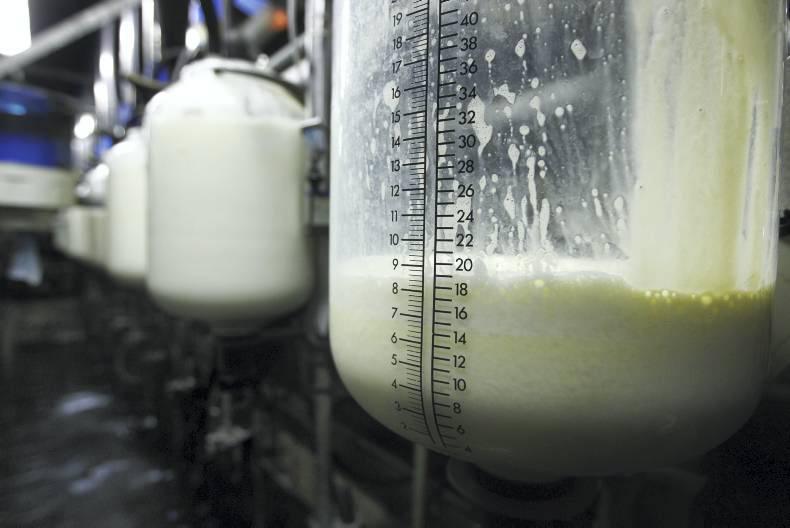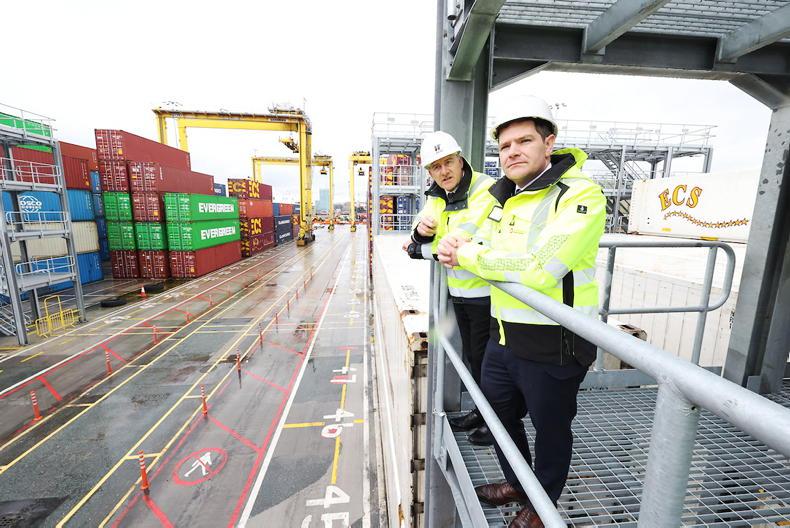The average farmgate milk price across the 28 EU member states did not fall for the month of July, according to the latest data from the European Milk Market Observatory (MMO). Figures from the MMO show an average price of €30.03/100kg (30.93c/l) was paid to EU farmers for the month of July, a marginal increase on the June price of €29.99/100kg (30.89c/l).
This marks the first time the average farmgate milk price in the EU has not fallen on a month-to-month basis since dairy production quotas were lifted back in March.
However, while any news of milk price stabilisation is certainly welcome, the outlook for dairy markets is still very uncertain as global demand remains weak, increasing the use of EU intervention and private storage schemes.
Demand
The signs from a demand point of view continue to be worrying. China remains the world’s largest importer of dairy produce despite recording decreases across the board for imports of all dairy products.
Chinese imports of WMP alone have more than halved in the first half of 2015 compared with the same period last year, reflecting the large build-up of stocks yet to be worked through. And for the first six months of 2015, Chinese imports of SMP from the EU are down more than a third.
More of a concern to EU exporters will be the drop in demand from important markets in the Middle East and North Africa.
Algeria is the EU’s most important market destination for SMP and WMP, accounting for 11% of all milk powder exports in 2014. However, for the first six months of this year, volumes exported from the EU are significantly down as Algeria has been awarding more of its milk powder tenders to Fonterra.
Volumes of WMP exported from the EU to Algeria have fallen by almost 60% so far this year to just under 22,000t. And while Algeria still remains the EU’s largest market for SMP, export volumes are back by a third to almost 55,000t.
Intervention
With the fall in demand from key export markets, more and more EU states have been taking product out of the market via private storage aid (PSA) and intervention.
Four EU member states have now sold product into intervention. Lithuania was the first country to avail of the EU scheme back in July. It has since been joined by Belgium, Poland and the UK with almost 6,000t of skimmed milk powder sold into intervention by the second week of August.
Figures up to 10 August show that more than 20,000t of Irish butter have been offered to the EU’s private storage aid scheme since the end of April this year.
The majority of this butter was offered into PSA in late May and July, although volumes have eased since the beginning of August.
Overall, almost 132,000t of butter have been offered for PSA from across EU member states so far this year, with the majority of this coming from the Netherlands, Ireland and Denmark.
Significant volumes of SMP have also been offered into PSA by EU member states, particularly Denmark, Spain and Lithuania, totalling more than 43,000t as of mid-August. However, weekly volumes have also been in decline since the end of July.
Raise in price
Speaking on Friday, Minister for Agriculture Simon Coveney said he would be meeting with EU Commissioner for Agriculture Phil Hogan in Brussels on Thursday next week to discuss helping dairy farmers through this difficult period.
Minister Coveney told RTÉ on Friday that he would again ask Hogan to consider an increase in the intervention price along with supports for aid to private storage. The intervention price is currently the equivalent of around 21c/l and Coveney said he would like to see the price increased to 25c/l at the very least.
Coveney clarified that the current crisis in dairy markets is linked to geopolitical events such as the Russian ban on EU food products and the over-purchasing of dairy products in China in recent years.
Read more
Intervention price rise would take 18 months
Summer milk price cuts continue for Irish milk processors
The average farmgate milk price across the 28 EU member states did not fall for the month of July, according to the latest data from the European Milk Market Observatory (MMO). Figures from the MMO show an average price of €30.03/100kg (30.93c/l) was paid to EU farmers for the month of July, a marginal increase on the June price of €29.99/100kg (30.89c/l).
This marks the first time the average farmgate milk price in the EU has not fallen on a month-to-month basis since dairy production quotas were lifted back in March.
However, while any news of milk price stabilisation is certainly welcome, the outlook for dairy markets is still very uncertain as global demand remains weak, increasing the use of EU intervention and private storage schemes.
Demand
The signs from a demand point of view continue to be worrying. China remains the world’s largest importer of dairy produce despite recording decreases across the board for imports of all dairy products.
Chinese imports of WMP alone have more than halved in the first half of 2015 compared with the same period last year, reflecting the large build-up of stocks yet to be worked through. And for the first six months of 2015, Chinese imports of SMP from the EU are down more than a third.
More of a concern to EU exporters will be the drop in demand from important markets in the Middle East and North Africa.
Algeria is the EU’s most important market destination for SMP and WMP, accounting for 11% of all milk powder exports in 2014. However, for the first six months of this year, volumes exported from the EU are significantly down as Algeria has been awarding more of its milk powder tenders to Fonterra.
Volumes of WMP exported from the EU to Algeria have fallen by almost 60% so far this year to just under 22,000t. And while Algeria still remains the EU’s largest market for SMP, export volumes are back by a third to almost 55,000t.
Intervention
With the fall in demand from key export markets, more and more EU states have been taking product out of the market via private storage aid (PSA) and intervention.
Four EU member states have now sold product into intervention. Lithuania was the first country to avail of the EU scheme back in July. It has since been joined by Belgium, Poland and the UK with almost 6,000t of skimmed milk powder sold into intervention by the second week of August.
Figures up to 10 August show that more than 20,000t of Irish butter have been offered to the EU’s private storage aid scheme since the end of April this year.
The majority of this butter was offered into PSA in late May and July, although volumes have eased since the beginning of August.
Overall, almost 132,000t of butter have been offered for PSA from across EU member states so far this year, with the majority of this coming from the Netherlands, Ireland and Denmark.
Significant volumes of SMP have also been offered into PSA by EU member states, particularly Denmark, Spain and Lithuania, totalling more than 43,000t as of mid-August. However, weekly volumes have also been in decline since the end of July.
Raise in price
Speaking on Friday, Minister for Agriculture Simon Coveney said he would be meeting with EU Commissioner for Agriculture Phil Hogan in Brussels on Thursday next week to discuss helping dairy farmers through this difficult period.
Minister Coveney told RTÉ on Friday that he would again ask Hogan to consider an increase in the intervention price along with supports for aid to private storage. The intervention price is currently the equivalent of around 21c/l and Coveney said he would like to see the price increased to 25c/l at the very least.
Coveney clarified that the current crisis in dairy markets is linked to geopolitical events such as the Russian ban on EU food products and the over-purchasing of dairy products in China in recent years.
Read more
Intervention price rise would take 18 months
Summer milk price cuts continue for Irish milk processors








SHARING OPTIONS